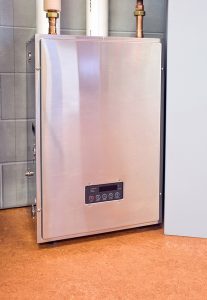“Wait, tankless water heaters need maintenance too?” As a matter of fact, yes!
No matter what type of water heater you have installed in your home, it can suffer from something called scaling. Scaling is the mineral buildup that results in a noisy system as well as pressure problems, temperature fluctuations, and potentially even water heater corrosion. Tank water heaters go through a scaling process in order to eliminate this problem, but the process is different for their tankless counterparts.
THE IMPACT OF SCALING ON A TANKLESS WATER HEATER

Scaling impacts a tankless system much like it affects a standard tank water heater, and therefore by neglecting maintenance, you could find yourself facing a water heater replacement sooner rather than later.
Calcium and magnesium are the minerals that cause this scaling phenomenon, and while they aren’t harmful for you to ingest, they are harmful to every aspect of your plumbing system—with your tankless water heater being no exception.
This mineral buildup is what we’re referring to when we talk about scaling. It has an effect on the heat exchanger portion of your tankless water heater. As you may know, the heat exchanger is the component that’s actually responsible for heating the water to begin with. You need this component to be clean so it can effectively heat the water. Scaling makes your burners work harder and can overwork a tankless system completely.
ABOUT THAT TUNE-UP
So, when should you schedule tankless water heater maintenance? The short answer is, “it depends.” For tankless water heaters in some communities, annual maintenance is a must to keep the system running smoothly throughout its entire lifespan. For others, though, maintenance can usually wait a couple of years.
How do you know the difference? Well, by having your home tested to see how bad the hard water is in your area. In some parts of the country, and even in different parts of the state, mineral deposits can be more prevalent. A professional plumber in Bergenfield, NJ will be happy to check for hardness, but you may be able to tell on your own. If you notice a chalky white or yellow buildup around faucets or drains, you likely have hard water putting your tankless system at risk.
“WHEN SHOULD I REPLACE MY TANKLESS SYSTEM?”
Annual, or semi-annual, maintenance is essential for a water heater of any kind. But, it won’t make that system last forever. There will eventually come a point that you’ll need to replace your tankless water heater with a newer system. The good news is, they usually last longer than their traditional tank counterparts—about 20 years.
If your system begins failing before this point, it could very well be due to lack of maintenance. Staying on top of tune-up sessions is the only way you can ensure your tankless water heater lasts as long as possible. Be sure to check with your professional plumber to get an accurate idea of the state of your tankless system so you know what to expect moving forward.
Contact BZ Dependable Plumbing & Heating. today for quality plumbing service and guaranteed satisfaction.

